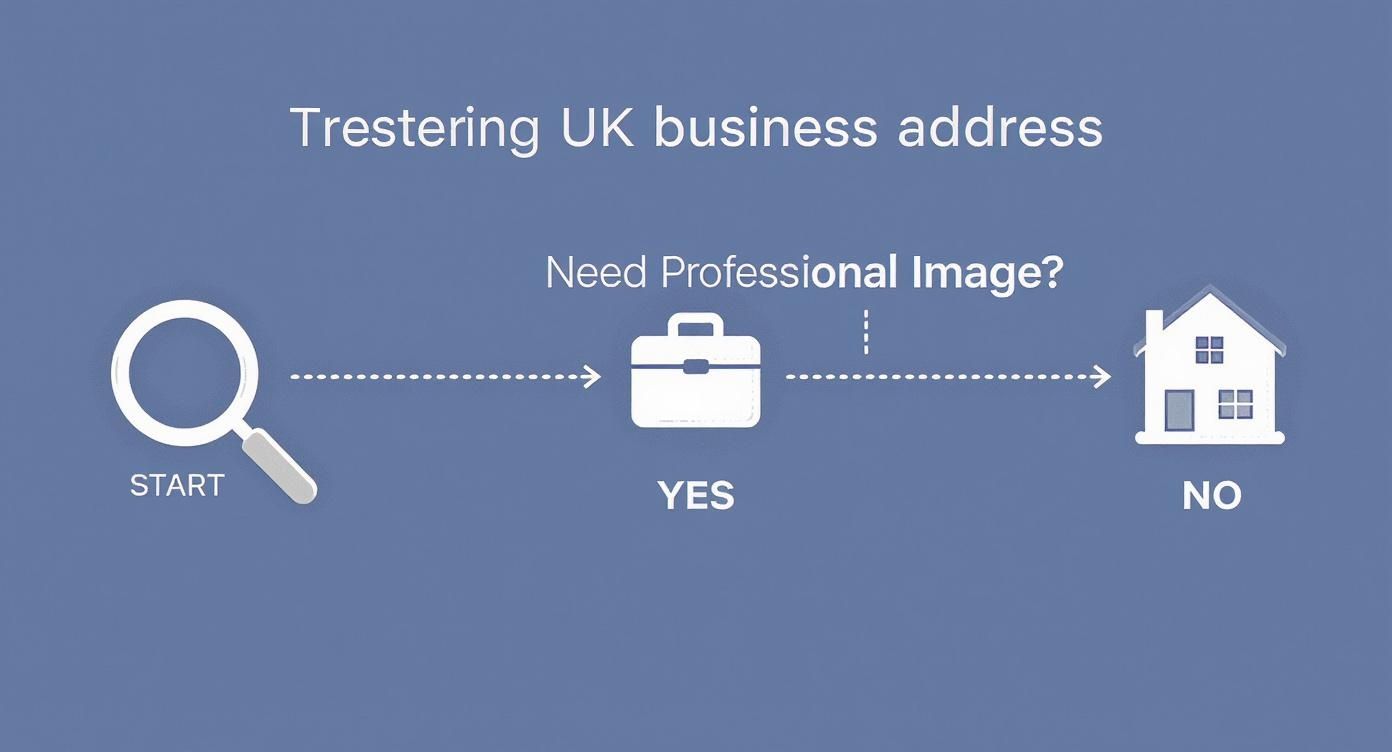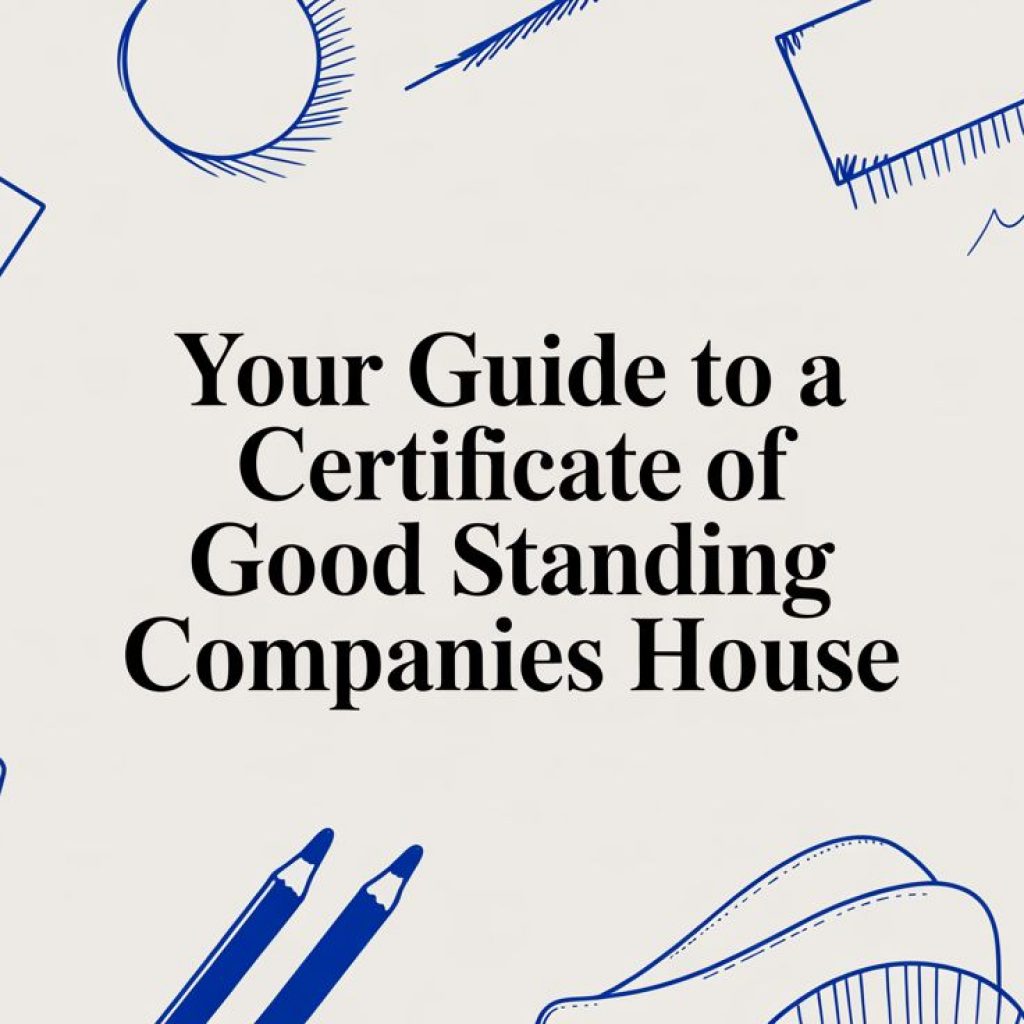Changing Address at Companies House
How to Get a Business Address: A UK Guide for Your Company – Getting a business address sorted in the UK is pretty straightforward. You’ve got three main routes: use your home address, rent a mailbox, or sign up for a virtual office service. Which one is right for you? It boils down to your business structure, privacy needs, and the professional image you’re aiming for. Nailing this decision early is one of the most important first steps for any new venture, setting the stage for everything from legal compliance to customer trust.
Why Your Business Address Is A Strategic Decision
Choosing your business address isn’t just about ticking a box on a form; it’s genuinely one of the first strategic moves you’ll make. This address becomes a massive part of your company’s identity, affecting everything from how customers see you to your legal and financial footing. It’s the location that will appear on all your official documents, your website, and your marketing materials, directly shaping your brand’s credibility from day one.
For example, imagine you’re launching a freelance consulting business. An address in a well-known commercial district immediately signals professionalism and stability to potential corporate clients. For start-ups and online businesses, that perception can be a huge advantage right out of the gate.
The Immediate Impact On Your Business
The ripple effects of your choice are immediate and surprisingly wide-ranging. Your address directly impacts:
- Legal Compliance: Your registered office has to be a physical UK address where you can receive official mail from Companies House and HM Revenue & Customs (HMRC). A standard PO Box just won’t cut it for this. View our range of virtual mailing address services
- Banking Relationships: High-street banks often want to see a credible, verifiable business address before they’ll approve a business bank account. Using a residential address can sometimes raise questions and slow down the application process. View our range of virtual mailing address services
- View our range of virtual mailing address services
- Privacy and Security: Using your home address is free, which is tempting, but it puts your personal details right on the public record. This can lead to anything from junk mail to unwanted visitors, completely blurring the line between your home life and your work. View our range of virtual mailing address services
- Brand Perception: The address you choose tells a story. A virtual address in a well-known business district sends a very different message than a residential one in the suburbs. View our range of virtual mailing address services
Your business address isn’t just a point of contact. It’s a powerful tool that anchors your company’s identity, protects your privacy, and unlocks opportunities for growth by building trust from day one.
Understanding these points helps you shift from simply needing an address to strategically choosing one. Getting it right provides a solid foundation, while getting it wrong can create unnecessary headaches down the line.
For example, sole traders often start out using their home address, but many find they need to rethink this as their business grows. To see how these factors play out in the real world, take a look at our detailed guide on selecting a business address for a sole trader. Making a thoughtful choice now saves you from administrative nightmares and sets your business up for success.
Comparing Your UK Business Address Options
Deciding on a business address in the UK is about more than just picking a spot for your post to land. Each type of address serves a very specific purpose, and the one you choose says a lot about your business. Getting your head around the options—from the ones the law requires to the one you show your customers—is the first step to setting your company up for success.
Let’s unpack the main types of addresses you’ll come across. We’ll look at what they are, why you might need them, and how they fit into the bigger picture of running your business.
This decision tree gives you a quick visual guide, especially if you’re weighing up how important a professional image is for your new venture right from the get-go.

Ultimately, your immediate needs—especially around brand perception and privacy—will point you toward the right address solution from day one.
Choosing the right address can feel complex, but it boils down to understanding what each type is for. This table breaks down the four main options side-by-side to make your decision a bit easier.
UK Business Address Types At a Glance
| Address Type | Primary Use | Best For | Key Consideration |
|---|---|---|---|
| Registered Office Address | Official government correspondence (Companies House, HMRC) | All UK limited companies (it’s a legal must-have) | It’s on the public record, so privacy is a major concern. |
| Director’s Service Address | Official correspondence for company directors | Directors who want to keep their home address private | Also on the public record; often bundled with a registered office. |
| Trading Address | Day-to-day business with customers, suppliers, and banks | Any business that interacts with the public | This is your public-facing image; it needs to look professional. |
| Virtual Office Address | A flexible address for mail, branding, and legal use | Start-ups, remote businesses, international companies | A cost-effective way to get a professional address without renting an office. |
Each address plays a distinct role, but as you can see, there’s often overlap. For many new businesses, a solution that covers multiple needs is the most efficient way forward.
The Legally Required Registered Office Address
Every limited company in the UK is legally required to have a Registered Office Address. There’s no getting around this one. It’s your company’s official address for all mail from Companies House and HM Revenue & Customs (HMRC).
This address is put on the public record, which means anyone can find it online with a quick search. It’s for this very reason that most founders steer clear of using their home address. The main rules are simple: it must be a physical address in the UK, and a standard PO Box won’t cut it.
A practical example is a new tech start-up where founders work from home. They use a professional registered office service to keep their home addresses private and ensure a dedicated team handles official documents reliably.
Protecting Your Privacy with a Director’s Service Address
Just as the company needs an official home, so do its directors. The Director’s Service Address is the official contact point for a company director and, like the registered office, this address is also publicly available.
Its main job is to shield the director’s personal life from public view. By using a professional service address instead of your home address, you stop your personal details from being out there for anyone to see.
This separation is vital for maintaining a professional boundary. It makes sure any legal notices or official mail meant for you as a director are sent to a secure, professional location—not your family home.
It’s common practice for the Director’s Service Address to be the same as the Registered Office Address, especially if you’re using a third-party provider. This just simplifies mail handling and keeps everything organised under one roof.
Your Customer-Facing Trading Address
While the first two addresses are for official eyes only, your Trading Address is the one you share with the world. You’ll see it on websites, business cards, invoices, and marketing materials. It’s where your customers, suppliers, and business partners will send their mail.
For an e-commerce brand, this is the address used for customer returns. For a freelance consultant, it’s what goes on their website to project a professional image and provide a point of contact that isn’t their home.
Crucially, your trading address doesn’t have to be the same as your registered office. Many businesses choose a more prestigious or convenient trading address for public-facing activities while keeping their official registered office completely separate.
The All-in-One Virtual Office Address
A Virtual Office Address is an incredibly flexible and budget-friendly solution that can tick all the boxes we’ve just talked about. It gives you a real, physical street address without the crippling cost of renting an actual office. For start-ups, remote businesses, and international entrepreneurs, this service is a complete game-changer.
With a virtual address, you get a professional location that can act as your:
- Registered Office: It meets every legal requirement for Companies House and HMRC. Registered Office
- Director’s Service Address: It keeps directors’ home details safely off the public record. Directors Service Address
- Trading Address: It gives your business a credible presence in a well-regarded location. Virtual Trading Address
Most providers also throw in mail handling services, like forwarding your post or scanning it straight to your email inbox. This means you can run your business from literally anywhere in the world while projecting a solid, professional UK presence. If you want to dig deeper into the benefits, you can explore what a complete virtual address for business in the UK really offers.
Meeting Legal and Banking Requirements
Getting a business address isn’t just a box to tick on your to-do list. It’s a foundational step that has a direct impact on your company’s legal status and its ability to operate financially. Before you can open a bank account or build your brand, you need an address that satisfies the UK’s regulatory framework. This isn’t just red tape—it’s about proving your business is legitimate, transparent, and ready for official scrutiny.
The first major hurdle is the absolute legal requirement for a registered office address. This is non-negotiable for every limited company in the UK. This address acts as the official point of contact for government bodies, primarily Companies House and HM Revenue & Customs (HMRC).
The law requires a physical location where legal documents can be officially served. This address is also published on the public record, which is exactly why so many founders choose not to use their personal home address.
The Role of Your Registered Office
Think of your registered office as the central hub for all official mail. If HMRC needs to send a tax notice or Companies House is chasing your annual confirmation statement, it’s coming to this specific address.
Missing these communications can lead to serious consequences, from hefty fines to your company being struck off the register. This makes reliable mail handling essential for staying in good legal standing. If you ever need to change it, it’s a formal process. Our guide on how to change a registered address with Companies House breaks down the steps you need to take to stay compliant.
This regulatory requirement is one of the biggest considerations when getting a business address in the UK. With around 2.73 million businesses registered for VAT and/or PAYE, all are legally required to have a registered address for official communications. You can dig deeper into the scale of UK business activity via the Office for National Statistics.
Key Takeaway: Your registered office address is your company’s legal anchor. It must be a physical UK address capable of receiving official mail, and failing to manage it correctly can put your entire business at risk.
Navigating Business Banking Requirements
Once your legal address is sorted, the next challenge is opening a business bank account. UK banks are thorough with their checks, and your address is a core part of their due diligence and ‘Know Your Customer’ (KYC) processes.
Banks need certainty that your business is legitimate and has a verifiable physical presence in the UK. A professional business address, like one from a virtual office provider, tends to make this process smoother than using a residential address that might raise questions.
To get an account open, you’ll generally need to have these key documents ready.
- Proof of Business Address: This could be a utility bill, a lease agreement, or the service agreement from your virtual office provider.
- Proof of Identity: A valid passport or driving licence for every company director.
- Proof of Personal Address: A recent bank statement or utility bill for each director, confirming where they live.
- Company Formation Documents: Your Certificate of Incorporation and Articles of Association from Companies House.
Common Pitfalls and How to Avoid Them
This is a stage where many new entrepreneurs stumble. One common mistake is having inconsistent address details across documents. The address you provide to the bank must exactly match what’s on record at Companies House.
Another frequent slip-up is underestimating the bank’s verification process. They might look up your business on Google Maps. If your “office” shows up as a house in a quiet cul-de-sac, it could trigger more questions and slow everything down.
Actionable Insight: Before applying, create a “business documents” folder on your computer. Scan and save clear copies of all required IDs and proofs of address. Double-check that every detail matches perfectly. This simple prep work can prevent weeks of delay.
Picking the right address provider is a bigger deal than just ticking a compliance box. It’s a strategic move that affects your finances and how people see your brand. It’s tempting to just use your home address—it’s “free,” after all—but the hidden costs in lost privacy and credibility can be huge. On the flip side, you need to make sure any monthly fees you pay are actually delivering real value.
The trick is to look past the headline price and focus on what you’re truly getting. A cheap service that messes up your mail handling can end up costing you a fortune in missed opportunities or legal headaches. Think of it as a smart investment in your company’s foundation, not just another expense.

This is especially true here in the UK, where your location can make or break your business potential. An address isn’t just a pin on a map; it influences everything from operational costs to your local market presence. For example, London businesses pull in an average turnover of around £1.7 million each, which is nearly double the national average. That stat alone shows the economic clout of a capital city address.
It’s no wonder so many companies want a Central London postcode to boost their image, even if they can’t afford the rent. That’s where virtual address services have become the go-to solution, giving you access to prestigious postcodes without the eye-watering price tag. You can get more insights into the UK’s SME landscape and its stats here.
Evaluating a Provider’s Core Services
Before you commit, you need to get under the bonnet and see what you’re actually paying for. Not all providers are built the same, and the small differences in their core offerings can have a massive impact on your day-to-day.
Take a hard look at mail handling. It’s the most basic service, but it’s handled in wildly different ways. Some will just offer a simple mail forwarding service, physically sending your letters on to you—often for an extra fee. Others provide a ‘scan-to-email’ service, which is a game-changer for modern, mobile businesses.
Imagine a freelance consultant who travels a lot for work. A mail forwarding service would be a logistical nightmare, with important post piling up. But a scan-to-email service delivers everything straight to their inbox, so they can run their business from anywhere.
The best providers give you a choice. You might want that letter from HMRC scanned immediately, but you’ll definitely want your new business bank card securely forwarded. Flexibility in mail handling is the hallmark of a service that puts its customers first.
Beyond Mail: What Else Matters?
A truly great address provider does more than just handle your letters. Look for a suite of services that can grow with you. These extra features are often what separates an average provider from a brilliant one.
Here are the critical things to check when you’re weighing up your options:
- Location Prestige: Does the address give off the right vibe for your brand?
- Customer Support: How quickly can you get a real person to help you? Look for providers with an accessible, UK-based support team. A quick phone call should be all it takes to sort out a problem.
- Transparent Pricing: Are there any nasty surprises lurking in the small print? Check the terms for extra charges like handling parcels, scanning over a certain limit, or forwarding costs. The price you see should be the price you pay.
- Meeting Room Access: Can you hire a physical meeting room at your virtual address? This can be incredibly useful for meeting clients or getting the team together, adding a layer of professionalism to your setup.
A Practical Vetting Checklist
To make things simpler, use this checklist to compare the providers on your shortlist. It’ll help you cut through the marketing fluff and focus on what’s actually important for your business.
Vetting Your Potential Address Provider
| Feature to Check | What to Look For | Why It’s Important |
|---|---|---|
| Service Flexibility | Can you easily switch between mail forwarding and scanning? | Your needs will change. Your provider should be able to keep up without any hassle. |
| Online Portal | Do they have a user-friendly online dashboard to manage your mail and account? | A good portal saves you time and puts you in complete control of your correspondence. |
| Customer Reviews | What are real customers saying on sites like Trustpilot or Google? | Honest feedback reveals reliability, support quality, and hidden issues you only see after signing up. |
Picture a new tech start-up looking for its first round of funding. They might choose a provider with a prestigious London address that also offers meeting room hire. The monthly fee might be a bit higher, but the return on investment is huge. That postcode adds credibility with investors, and having a professional space to hold meetings helps them seal the deal. They’ve made a strategic choice, not just a cheap one.
A Step-by-Step Guide to Setting Up Your Business Address
Right then, you’ve picked your provider. What’s next? Getting your new business address up and running is actually the quick part, but a little bit of prep work makes the whole process silky smooth.
This is your practical checklist for getting it done—from gathering your documents to officially telling the world (and the taxman) about your new address.

Follow these steps and you’ll be set up properly, looking professional, and ready to get that important post without a hitch.
1. Get Your ID Sorted for AML Checks
First things first, any reputable provider is legally required to run Anti-Money Laundering (AML) checks. This isn’t just red tape; it’s a crucial step to verify your identity and prevent fraud. Having your documents ready to go from the outset is the key to a fast setup.
For every director, you’ll need to provide two key documents. Having clear digital copies—good quality scans or photos—will speed things up massively.
- Proof of Identity: A valid, government-issued photo ID. A passport or a UK driving licence is perfect.
- Proof of Address: A recent document showing your personal home address, usually dated within the last three months. A utility bill, council tax statement, or a bank statement works well.
Actionable Tip: Before you start the sign-up form, save your scanned documents as PDF or JPEG files in a folder on your desktop. This one simple action can take the whole setup process down to just a few minutes.
2. Choose Your Services and Sign Up
With your ID ready, you can fly through the provider’s sign-up form. This is where you’ll choose the exact services that fit your business and lock in your account details.
You’ll make a few key decisions here about how your post is handled. This is your chance to really tailor the service to how you work.
Signup to Acorn Business Solutions range of professional virtual mailing address services quickly and easily online
Key Service Decisions:
- Pick Your Address Package: Decide which addresses you need. Is it just a Registered Office Address, or a bundle that includes a Director’s Service Address and a general Trading Address?
- Set Your Mail Handling Rules: How do you want to get your post? The main options are usually mail forwarding (sending physical letters to you) or scan-to-email (opening, scanning, and emailing them). Mail Holding (mail held in branch for you to collect)
- Fill in Your Company Details: Enter your company name, registration number (if you have one), and the details for all directors. This needs to match what’s on the Companies House record exactly.
3. Make It Official: Update Your Records
Once your new address is active, the final job is to tell the authorities. This is the step that makes it all official and ensures you stay compliant.
For limited companies, your first port of call is Companies House. You can do this online, and the change is usually live within 24 hours.
- Update Companies House: Log into your Companies House account to file a change of Registered Office Address (Form AD01) and, if needed, a Director’s Service Address (Form CH01).
- Tell HMRC: You must also let HMRC know your new address for all things tax-related, including Corporation Tax, VAT, and PAYE.
- Notify Everyone Else: Don’t forget to update your business bank account, payment providers like Stripe or PayPal, your suppliers, and any other professional contacts.
Ticking off this checklist ensures a pain-free switch to your new professional address. It gets the practicalities sorted and, just as importantly, keeps your business fully compliant with UK rules right from day one.
Got Questions About UK Business Addresses?
Wrapping your head around the final details of getting a business address often throws up a few last-minute questions. It’s completely normal. Here are some straightforward answers to the queries we hear all the time, helping you get everything sorted with confidence.
Can I Use a PO Box for My Registered Office?
In a word, no. You can’t use a standard PO Box for your company’s registered office address in the UK.
Companies House is very clear on this: the registered office has to be a physical street address where legal documents can be officially delivered. It’s about ensuring government bodies like HMRC and Companies House have a reliable, verifiable place to contact your business. A PO Box just doesn’t meet that legal test.
However, this is exactly where a virtual business address comes in. It gives you a real, compliant street address that ticks all the legal boxes, offering the convenience of a mailbox but with the full legal standing your company needs.
What Is the Difference Between a Business Address and a Registered Office?
This is a really common point of confusion, but it’s simple when you break it down.
- A Registered Office is your company’s official, legal address. It’s where all correspondence from Companies House and HMRC goes, and it’s listed on the public record. Every UK limited company is legally required to have one.
- A Business Address (often called a Trading Address) is the one you use for your day-to-day operations. You’d put this on your website, invoices, and business cards. It’s the address your customers and suppliers actually see.
They can be the same address, of course. But many business owners choose to use a professional virtual address for their public-facing business address to keep their official registered office (which might be their home) private.
How Quickly Can I Set Up a Virtual Business Address?
It’s remarkably fast. Most providers, including us, can get your new business address activated within a single business day—often in just a few hours.
Acorn Business Solutions offer same business day setup. Simply order your virtual address for 2pm for same business day setup (orders after 2pm will be processed next business day)
Do I Need a UK Address If I Run My Business From Abroad?
Yes, you absolutely do. If you want to register a limited company in the UK, you are legally required to provide a UK-based registered office address.
This rule applies even if you, the founder, live and run the business entirely from overseas.
A virtual office is the perfect solution for international entrepreneurs. It provides a compliant UK address that unlocks the market, allows you to open a UK business bank account, and makes sure you meet all your legal obligations without ever needing a physical presence here.
Ready to secure a professional and compliant UK business address today? Acorn Business Solutions offers a range of flexible and cost-effective virtual address packages to get your company set up in minutes. Explore your options at https://acornbusinesssolutions.com.






